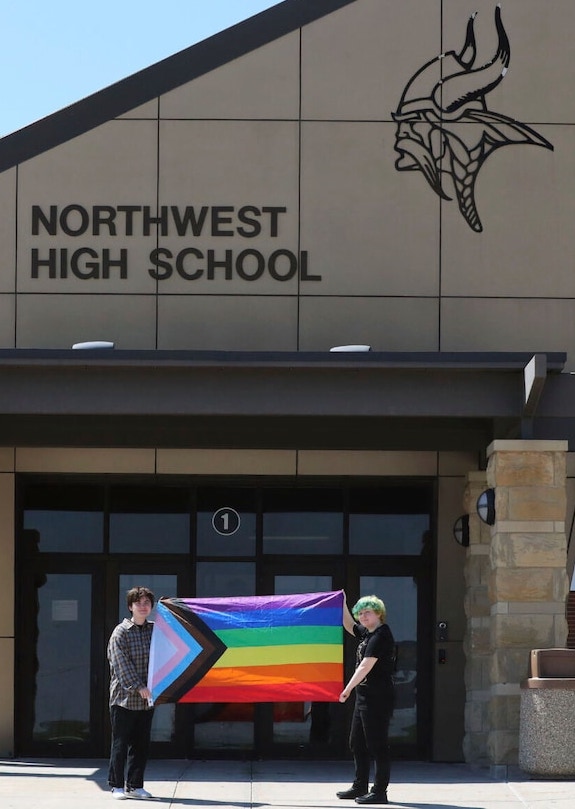
Marcus Pennell, left, and Emma Smith — former Viking Saga newspaper staffers — outside Northwest High School in Grand Island, Neb., July 20. (McKenna Lamoree/The Independent via AP)
It’s never good for a high school when a reporter or editor of the school paper is writing a commentary for the Washington Post. Generally, when that happens, the school administration or school board has come down hard with some form of censorship on the student newspaper. That’s what happened in Grand Island, Nebraska, in June 2022.
Northwest High School’s Viking Saga had a pretty conventional cover, with a lead story about four siblings who had moved through a range of foster care but were now getting adopted into one family. Other stories on the cover told the story of a student whose sculpture was honored in a national competition, the appeal of trapshooting as a competitive sport, and the success of the school’s Future Business Leaders of America group. But what caught the attention of the school’s administration and the school board were a collection of articles dealing with LGBTQ+ issues, including a history of Pride Month under the headline “Pride and Prejudice: LGBTQIA+” written by associate editor Emma Smith, a commentary on the science of gender by staff writer Hiapatia McIntosh, and an editorial on Florida’s controversial “Don’t Say Gay” bill written by trans staff writer Marcus Pennell.
Only Marcus’s article was under the name “Meghan Pennell,” the name Marcus had been born with. A month or so before the paper was shut down and the newspaper journalism class canceled, the staff had been reprimanded after publishing preferred pronouns and names for bylines and in articles. District officials told students they could use only birth names from that point on.
The Washington Post helped bring national attention to the newspaper’s shutdown, or “cancellation” as some of the students referred to it, when it published a commentary by Pennell. Following his graduation, Pennell wrote:
The trouble started when I changed five letters in my first name.
My birth certificate reads “Meghan.” But my peers at Northwest High School in Nebraska knew me as “Marcus.” Changing my name wasn’t supposed to be a political statement. But our local school board has turned it into one…. Whether the administra- tion, parents or other students liked it or not, there were LGBTQ kids at Northwest, and taking away our liberty to be ourselves wasn’t going to change that.
Officially, the school district’s administration declined to say why or how the newspaper was shut down, but an email from a school employee to the Grand Island Independent local newspaper said it was “because the school board and superintendent are unhappy with the last issue’s editorial content.” The school board vice president had been previously quoted as saying, “I do think there have been talks of doing away with our newspaper if we were not going to be able to control con- tent that we saw (as) inappropriate.”
This all raises the question: Can the school district legally do this? Can it shut down a long-running, award-winning newspaper and cancel the newspaper curriculum just because it doesn’t like the paper writing about queer issues? In Nebraska, the answer was mostly “yes,” even if the district in the long run had a hard time making the cancellation stick. In principle, high school students do have free speech rights, but if a student newspaper is produced as part of a class activity, the school can control its content for any “legitimate education reason,” under the U.S. Supreme Court’s Hazelwood School District v. Kuhlmeier decision that ruled that high school newspapers have only minimal protection under the First Amendment. And unlike some nearby states like Iowa and Kansas, Nebraska has not passed a law protecting the free speech rights of student publications.
- High School Journalism Students in Pittsburg, Kansas Take Down High School Principal With Questionable Credentials
- COVID19, Student Free Speech & Dress Codes
After enrolling as a journalism major at the University of Nebraska Omaha, Pennell, along with the Nebraska High School Press Association, with help from the American Civil Liberties Union of Nebraska, sued Grand Island Northwest Public Schools and its superintendent in federal district court, claiming that the district had violated Pennell’s First Amendment rights. The case was eventually dismissed by the judge because Pennell was no longer a student at the high school, but he noted, “School administrators would be wise to remember that policies and decisions to restrict speech in student newspapers … may run afoul of the First Amendment if they reflect ‘an effort to suppress expression merely because the public officials oppose a speaker’s view.’”
As for the student newspaper Viking Saga, it returned in the spring of 2023 as an online publication with a new faculty adviser, along with the class for producing it.
